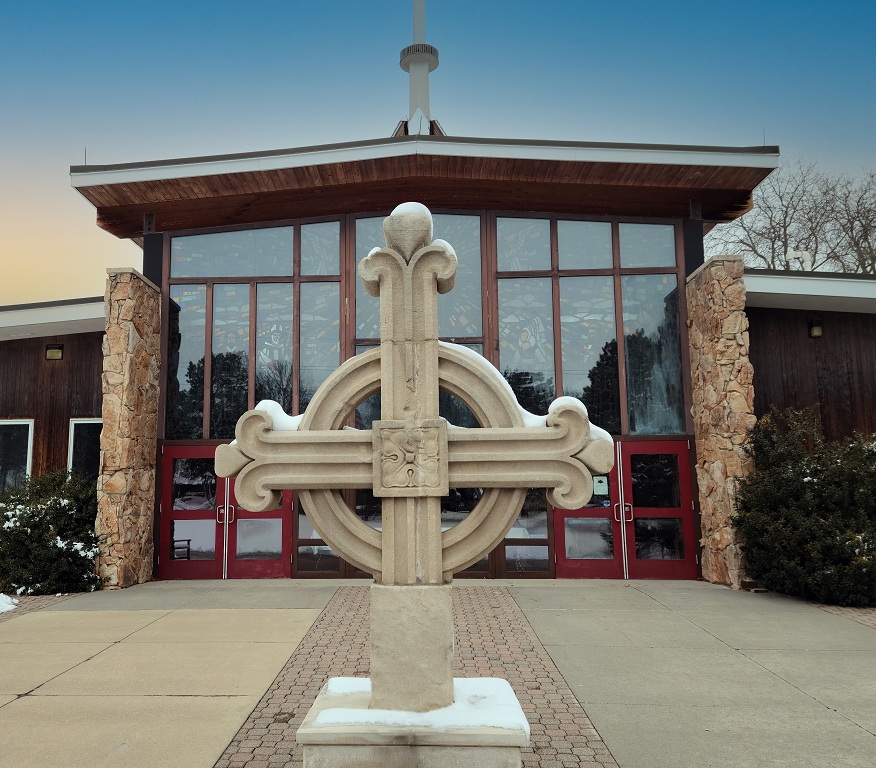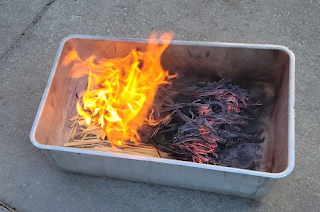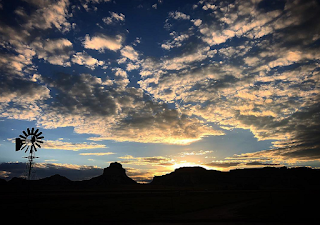Increase our faith
The apostles
said to the Lord, “Increase our faith!” – Luke 17:5 (Proper 22C)
Here’s
something that used to drive my wife Lisa crazy: she’d be out doing something
alone—what I mean is without three kids tagging along—not something like hanging
with friends at one of those paint-and-drink-wine places that have popped up recently—but
something like having a quiet, leisurely, blissful, pampering, very special
solo trip to Target—and someone would ask her, “Oh, is Keith home babysitting
the kids?” Lisa, being a very nice person, would simply say, “Yes,” but what
she was screaming inside her head was, “No, he is NOT babysitting
the kids—You don’t babysit your own kids—that’s what you pay others to do—taking
care of your own kids is just parenting! It’s what you’re
supposed to do!”
I think
in today’s Gospel reading Jesus was possibly feeling that same frustration Lisa
was. We hear him ask the Apostles, “Would you tell your slaves when they come
in from the field to sit and dine?” The answer is “Of course not.” “Do you
thank your slaves for doing what is commanded?” “Of course not.” Jesus says,
“So you also, when you have done all that you were ordered to do, say, ‘We are
worthless slaves; we have done only what we ought to have done.’” This seems
like a sort of slap in the face? What prompted Jesus’ frustration?
The
Apostles had just pleaded, “Jesus, increase our faith!” Now, I think most of us
have come to think that being a “person of faith” means being someone who holds
fast with clenched fists and closed eyes to beliefs that are at odds with
science and reason. Being a person of great faith, in our current society, has perhaps
come to mean the opposite of being rational. Science is the enemy of Faith …But
this sense of faith as “crazy belief” is not the way the word “faith” is used
in the Gospel of Luke. Here’s how the word is used by Luke: There are the people
who carried their friend who knows how far, and, when they could not get close,
climbed up and lowered him through the roof tiles—Jesus sees the faith in their
effort and heals the invalid (5:20). A woman anoints Jesus’ feet with her tears
and dries them with her hair, and he says to her, “Your faith has saved you”
(7:50b) A woman touches Jesus’ robe and is healed, and Jesus says, “Your faith
has made you well” (8:48). A Samaritan leper—one of ten who was cured—returns
to give thanks, and Jesus says, “Did none but this foreigner return to give
praise for being healed? Your faith has made you well” (17:19). A blind man continues
to cry out to Jesus, refusing to keep silent even when ordered to, and Jesus
says, “Your faith has saved you” (18:42).
So it
seems that being a person of faith is not so much about what you believe,
but more about what you do. Faith is not so much something stockpiled in
a storehouse, but something that is lived out as obedience to a just and
loving God. Trusting in the One with whom we are in relationship, a faithful
person relinquishes any illusions of self-reliance, acknowledging that faith
cannot be measured, only enacted (Kimberly Bracken Long, Feasting on the
Word). The disciples have this wrong-headed idea that faith is something
that can be poured into them, something that they need a supersized big gulp cup
of. Jesus is trying to tell them that the right question isn’t how much
faith is enough, but rather “what is faith for?” I can see Jesus pinching
his fingers and saying, “You already have plenty of faith—this much—a
mustard-seed-size—is enough!” “You just need to live your faith, and if you
did, you could tell this mulberry tree to uproot itself and be planted in the
sea.”
Do you
all have experience with mulberry trees? We’ve lived in our house 27 years, and
literally, for every one of those years, we’ve battled the same mulberry tree. We’ve
cut it down, dug it up, poisoned it…and still, year after year, it comes back. If
you google “mulberry tree roots” the top results are: “does anything kill a
mulberry tree…how do you dig up a mulberry tree…invasive mulberry tree…”
Mulberry trees have an extensive root system that grows both wide and deep;
they are very, very tenacious. And yet Jesus says with only a mustard seed’s
amount of faith, we could have gotten rid of ours.
Of
course, the Apostles didn’t need to dig up a mulberry tree like I do…What was
it that they needed more faith for? You remember last week we heard Jesus tell
the story of the rich man who had stepped over poor Lazarus every day on his
doorstep, the rich man who in death was stuck in torment while Lazarus was
comforted in the bosom of Abraham. This rich man asked Abraham to send Lazarus
back from the dead, like Jacob Marley visiting Scrooge, so that his friends and
family will finally see a miracle so big it will give them faith big enough
that they’ll repent. And Abraham essentially replied, “They already had Moses
and the Prophets…if that message didn’t “take,” then even someone rising from
the dead won’t. It’s not about big faith; it’s about doing what you already
know you should with the faith you already have.
Just
after Jesus tells that story, the lectionary skips a few verses in between today’s
reading, and these verses are what cause today’s plea for more faith by the
Apostles. Jesus says, “If the same person sins against you seven times a day,
and turns back to you seven times and says, ‘I repent,’ you must forgive”
(17:4). The Apostles here this, and they think, “OMG—we have to do that!
You mean you were serious about that ‘forgive us our trespasses as we forgive
those who trespass against us’ thing? Jesus, give us more faith!”
And
Jesus replies, “You don’t need more faith…like slaves obedient to their master,
you need to just do what you ought to do.” If we could have the tiniest bit of
faith, we could admit that it’s not our power that does things, ever—it’s Gods.
We could see that the world is sustained by and infused with God’s love and
God’s presence and God’s power, and that this power that upholds the universe
every second is present in us, present in God’s people, equipping us and
calling us to action—equipping us and calling us to forgive seventy times
seven; equipping us and calling us to love and care for friend and stranger;
equipping us and calling us to cast down the mighty and lift up the lowly;
equipping us and calling us to feed the hungry and clothe the naked and preach
release to the captives. Over and over again in Luke, Jesus has said we have to
give all—because it’s never been ours anyway. It’s not our power that does
things, ever—it’s God’s. And that’s more than enough.
And so,
as you all dream about what you can do to work for God’s Kingdom to come on
earth as it is in heaven…as you dream about growing and bringing the Gospel
Good News to more and more people who need to hear it, remember that you already
have what you need. You have the vision, you have the money, you have the
energy, and you have the faith—all it takes is a mustard seed’s worth from you,
and God will uproot your mulberry trees and plant them in the sea. You don’t
need to believe impossible, irrational things—you just need to do them—because
it’s not you, ever—it’s God.





Comments
Post a Comment